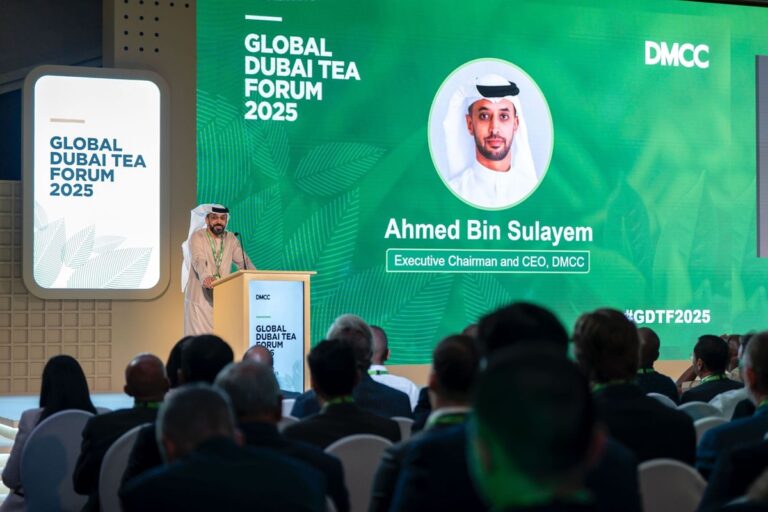Dubai freezone DMCC has projected the global tea market to grow from $282bn to nearly $300bn by the end of 2025, driven by premium, organic and ready-to-drink teas, climate-smart production and digital traceability.
The forecast was unveiled at the ninth Global Dubai Tea Forum (GDTF), where DMCC launched its latest Future of Trade: Tea special-edition report.
The study maps the evolution of an industry valued at $18bn in annual production and $9.8bn in global trade, supporting millions of smallholders worldwide.
According to DMCC, the report outlines a roadmap for a more resilient, inclusive and innovative tea economy, highlighting how trade hubs such as Dubai are redefining the global value chain.
Dubai at the centre of global tea re-exports
Long recognised as a logistics and re-export powerhouse, the UAE now accounts for more than half of the world’s tea re-exports.
The country is moving further up the value chain through advanced blending, packaging, flavour profiling, storage, tax efficiency and financial services, all facilitated by the DMCC Tea Centre.
Ahmed Bin Sulayem, Executive Chairman and CEO of DMCC, said: “Global tea consumption is nearing $300bn annually, driven by premium, organic and ready to drink formats, and the UAE sits at the centre of this shift.
“Since we launched the DMCC Tea Centre 20 years ago, Dubai has moved from logistics gateway to global hub for value creation. The real margin sits in value add, including blending, branding and verifiable provenance, so traceability and climate resilience are now commercial necessities.
“This year’s Global Dubai Tea Forum set a clear direction for the industry: build a tea economy that is climate smart, digitally traceable and commercially investable.
“We will continue convening the industry and scaling the platforms that turn those principles into competitive advantage.”
UAE trade ecosystem
Abdulaziz Al Nuaimi, Assistant Under-Secretary for Entrepreneurship and the Economic Affairs Regulatory Sector at the UAE Ministry of Economy, said:
“Dubai’s position as one of the world’s major tea re-export hubs reflects the UAE’s wider success in building a trade ecosystem defined by certainty, innovation and openness.
“Tea has been a driver of global commerce for centuries, and today it continues to connect producers and consumers through modern, technology-enabled value chains.
“By combining advanced infrastructure with efficient trade policy, the UAE has transformed tea from a traditional commodity into a catalyst for sustainable growth.
“This is what the UAE, Dubai and the DMCC Tea Centre offers.”
Steeped in success
Held under the theme “Tea at the Crossroads: Trade, Tariffs and Technology in an Age of Realignment,” this year’s GDTF brought together hundreds of government officials, producers, traders, buyers and multinationals to examine the challenges and opportunities reshaping the sector.
Discussions focused on how climate volatility, inflation and shifting consumer behaviour — particularly among Generation Z — are redefining demand, supply routes and product formats.
Participants also explored direct-to-consumer models, tariff pressures, equitable sustainability frameworks and the need for inclusive financing for smallholder farmers.
Building on DMCC’s research, attendees called for investment in climate-resilient farming, digital traceability systems, and wellness-focused product innovation, reflecting growing demand for functional and organic teas.
With climate risk already impacting major producers such as Kenya, experts warned that traceability and resilience are now commercial imperatives for the global tea trade.
DMCC Tea Centre: powering Dubai’s global role
Located within Dubai’s global trade ecosystem, the DMCC Tea Centre offers integrated storage, tasting, blending, packaging and re-export facilities that streamline global supply chains and accelerate product innovation.
In 2024, the centre handled more than 24,400 metric tonnes of tea, connecting producers from traditional origin markets with fast-growing consumer hubs across the Middle East, Europe and Asia.

